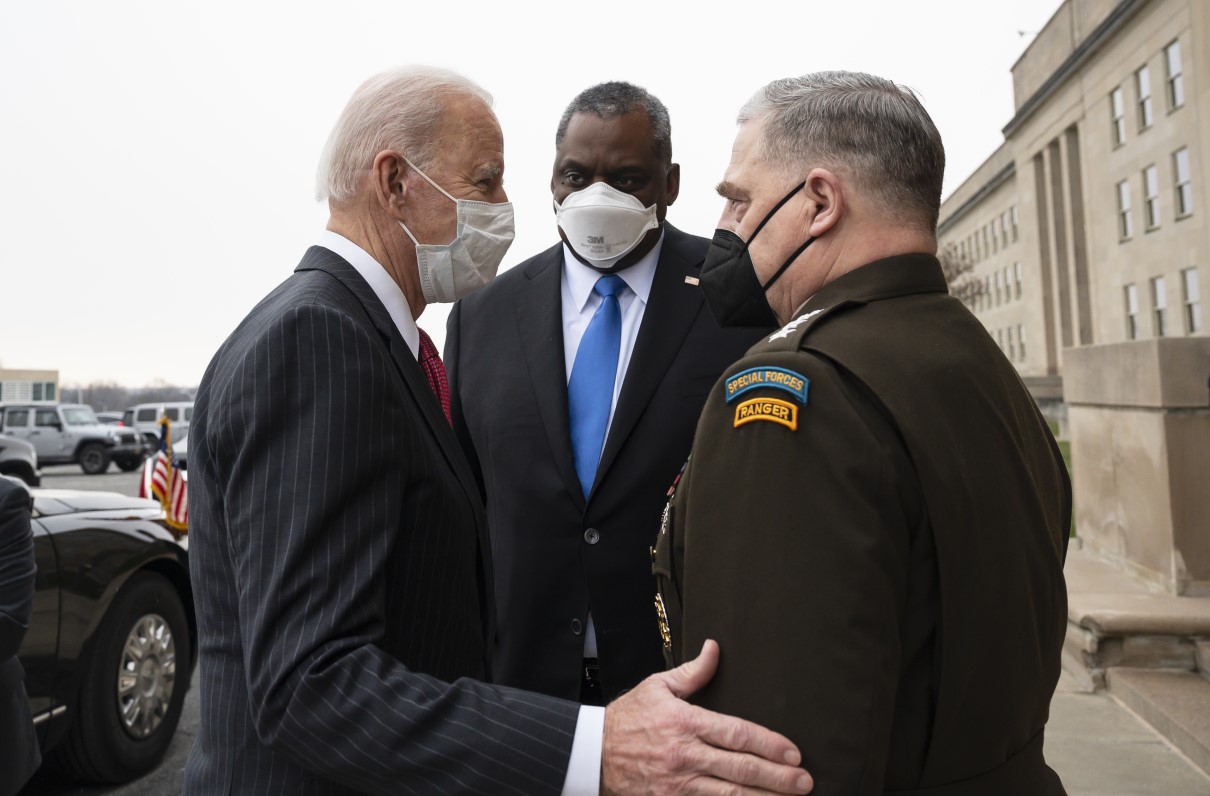President Joe Biden unveiled his top-line FY 2022 budget request April 9, which includes plans for a small increase in overall DoD funding and a significant uptick in VA spending.
The 58-page document sent to Congress outlines the administration’s plans for the federal budget to “lay a foundation to reinvest in the Nation’s strength,” it states.
The president is required by law to submit the federal budget to Congress by the first Monday in February, but this is usually delayed when a new administration takes office. The White House is expected to lay out a more comprehensive budget within the next several months.
Congress will begin its review of the budget proposal this week, with hearings that will question administration officials about their requests. MOAA will monitor this process closely to ensure our legislative priorities are at the forefront of both Congress and the administration’s agenda.
[RELATED: The Latest Advocacy News From MOAA]
While initial details are scarce, below are takeaways from the so-called “skinny budgets” of the federal agencies MOAA is tracking:
DoD
The DoD proposed budget is set at $715 billion, a 1.7% increase from the FY 2021 enacted level and roughly 0.5% behind inflation. The plan has received criticism from both directions: Some lawmakers have stated this figure is not a sufficient increase to maintain a strong national defense, while others have questioned the need for even the limited increase.
The budget will “support America’s servicemembers and families,” according to the White House report -- a standout priority for MOAA.
“Military families are key to the readiness and well-being of the all-volunteer force, and therefore are critical to national security,” the report states. “The discretionary request supports military families by prioritizing programs that directly support military spouses, caregivers, survivors, and dependents.”
This priority is timely, following Jill Biden’s official reintroduction of the Joining Forces program last week; the first lady had outlined plans for the program’s relaunch shortly before the 2021 inauguration.
[RELATED: MOAA Joins Jill Biden in Announcing Joining Forces 2.0]
The budget request did not include information on a military pay raise or any details on specific funding levels for the individual service branches. This information will be outlined when the administration releases a more detailed budget request in the coming months.
VA
The White House’s request calls for $113.1 billion in discretionary VA funding, up $8.5 billion (8.2%) from the FY 2021 enacted level. This money is in addition to the funds provided to the VA via the American Rescue Plan Act of 2021; find a full breakdown of those funds, via the VA’s VAntage Point blog, at this link.
Priorities highlighted in the administration’s request include:
- Medical Care: $97.5 billion for VA medical care in the discretionary request, up $7.6 billion (8.5%) from the FY 2021 enacted figure.
- Suicide Prevention: A nearly 75% increase to suicide prevention funding, from $230 million to a proposed $542 million.
- Technology Improvements: $2.7 billion to continue advancing the VA’s electronic health record modernization efforts, and another $4.8 billion to the VA’s Office of Information Technology.
- Agent Orange Claims Processing: $40.3 million to hire 334 new claims processors to support claims for new Agent Orange presumptive conditions – a MOAA-backed benefits expansion that became law as part of the FY 2021 National Defense Authorization Act (NDAA) and an increase to hire more benefits claims processors to help with Agent Orange conditions and reduce the pandemic-caused backlog.
- Medical Research: $882 million in discretionary funds – “the largest year-over-year increase in recent history,” per the report – for research on topics such as prosthetics, traumatic brain injury, and toxic exposure.
- Memorial Services: $394 million “to ensure veterans and their families have access to world-class memorial benefits,” per the report.
Department of Commerce
The Department of Commerce would receive $11.4 billion under this budget plan, an increase of 28% over the FY 2021 enacted level. Over half of this money -- $6.9 billion, up $1.4 billion from FY 2021 – would go to the National Oceanic And Atmospheric Administration (NOAA), including $800 million to expand climate observation and forecasting and help combat climate change-related challenges.
Department of Health and Human Services
The Department of Health and Human Services (HHS) would receive $131.7 billion. This is a 23.5% increase from the FY 2021 enacted level. MOAA will continue to pay close attention to the upcoming hearings on the HHS proposed budget for more information about the U.S. Public Health Service (USPHS) and the administration’s other health care priorities.
Department of Homeland Security
The Department of Homeland Security’s proposed funding would be nearly equal to the enacted budget for FY 2021 at $52 billion. The high-level budget plan does not provide details on Coast Guard funding.
MOAA’s Role
As Congress begins the budget and appropriations process over the next several months, and simultaneously begins to work on the FY 2022 National Defense Authorization Act, MOAA will continue to engage with legislators on provisions important to preserving the well-being of the total force.
As a nonpartisan organization, we will remain focused on working with officials from both sides of the aisle on key issues to support servicemembers, their families, retirees, veterans, caregivers, and survivors.
You can help MOAA keep our legislative priorities at the forefront by staying up to date on our spring advocacy campaign, MOAA’s Advocacy in Action, and by utilizing our Take Action Center.

